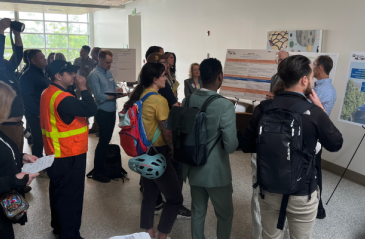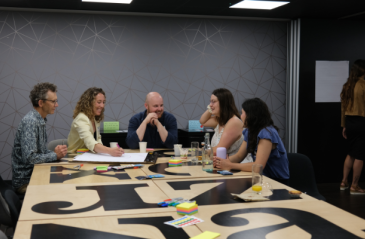
The information barriers holding back climate action and how to break them

There is a growing belief that information is an asset for empowering citizens to make decisions
Share articleWhile more governments have open data initiatives, global freedom is declining
Share articleFreedom of information and of expression are interdependent, say @Anna_D_Scott and @LizCarolan
Share articleWe put our vision for government into practice through learning partner projects that align with our values and help reimagine government so that it works for everyone.
Governments and NGOs around the world are increasingly seeing value in information openness.
Many are building and maintaining data portals for communities to access and use, from governments from France to Tanzania to multinational initiatives such as the European Data Portal. A growing number of governments that have not yet built capacity for a full data sharing programme have invested nonetheless in access to information initiatives, as have countless NGOs.
These initiatives chime with the growing belief that information is an asset for empowering citizens to make decisions and to question the actions of those in power. Public access to information is recognised as supporting sustainable development in SDG target 16 on peace, justice and strong institutions.
But the Open Data Barometer in 2015 observed that some of these gains have “disturbingly” taken place alongside a “backslide” in other freedoms, transparency, accountability, and privacy. While the number of governments with open data initiatives is growing, global freedom is in its 11th consecutive year of decline, according to Freedom House, and obstacles to media freedom throughout the world are increasing. The benefits that data's widespread availability and use can bring - to governments, communities and society more broadly - are increasingly well documented.
Data made open by governments can be used to support peaceful elections in transitional states, such as in Burkina Faso in 2015. It can be used by startups to develop innovative solutions that plug gaps in services, such as in Open Data Challenges around the world. It can be used to help connect governments with communities and engage them as stakeholders to define priorities, such as justice in Argentina.
Examples like these emerge where data is available, but also where there was a community of actors with the freedom and protection to build things using that data without fear of unfair censure. Governments should not assume they can make information more accessible and enjoy the benefits this brings without also ensuring freedom for people - whether citizens, journalists or companies - to use it freely.
Opening up access to information makes a government more vulnerable to criticism, but focusing on preventing potential criticism undermines that conditions that allow benefits to be realised. The role of leading an initiative involves convincing others to accept this vulnerability, as shown in ODI's research on organisational change and peer learning network.
Freedom of information and freedom of expression are interdependent. For open data programmes to be impactful, a number of conditions are required.
There are technical requirements, such as the availability of data in digital (online) formats, and the use of data standards - common ways of structuring datasets so that two or more can be combined to create new insights.
There are also two sets of legal, policy and political conditions. On the one hand, there are the policies, commitments and initiatives (like the Open Government Partnership and the Open Data Charter) those that enable government openness and data access and processing. Ghana is an example of a country doing well in this regard, coming second in Africa in the 2017 Press Freedom Index, with Burkina Faso and Chile not far behind.
Then there are the legal protections that enable a broad range of actors to build stories, services, apps and research, based on insights generated through processing the data, and to generate a response or change. These include those that safeguard civil society and freedom of expression and of speech.
We can see this in the data journalist's role. To do her job she needs: access to data, the skills and capacity to processes it, a story to investigate, the skills and capacity to tell it, and an outlet with the funding, independence and legal protection to pay her and publish the story.
But so too does the app developer building a service using, for example official education data. As well as skills and access, she need confidence that her product will not be subject to censure if someone decides product is critical of the state.
As the most recent Open Data Barometer said: “Open data initiatives cannot be effective if not supported by a culture of openness where citizens are encouraged to ask questions and engage, and supported by a legal framework.” This week we marked World Press Freedom Day - it is time for more governments to recognise and act on this.











